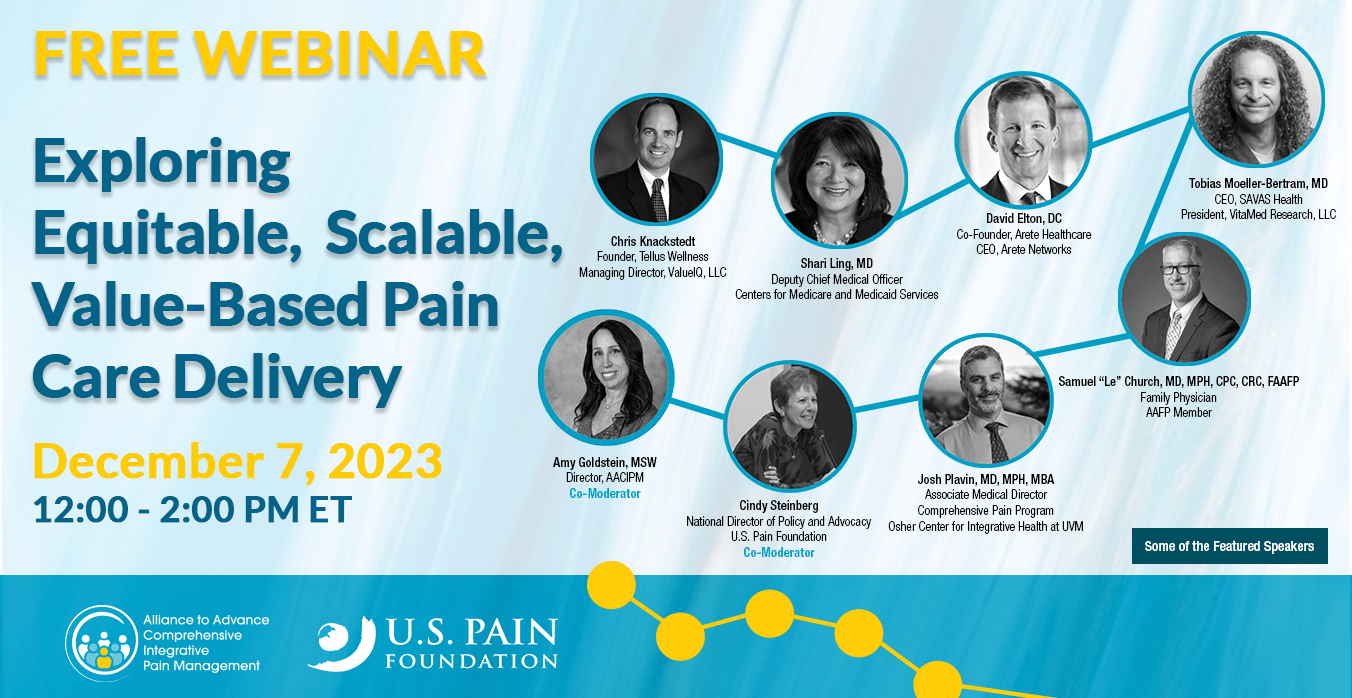
December 7, 12:00-2:00 ET
This Webinar and Survey Are Exploring Intersections Between Payer Policy & Value-Based Pain Care Delivery.
On behalf of the Alliance to Advance Comprehensive Integrative Pain Management and the US Pain Foundation, we invite you to join this lively and constructive discussion about the intersection of payer policies and value-based care delivery for high-impact pain.
Using feedback from this survey (open now!), we will look into the most recent value-based pain management codes released by CMS in January 2023 and how these are playing out in various clinical settings. Further, our esteemed panelists (see their bios) each bring a unique perspective and practical expertise to the conversation with an understanding of the nuances of how payer policies impact clinical—and scalable—implementation of pain care policy.
Participants in this free webinar will learn about:
- CMS efforts to advance value-based care, including the new CMS pain codes – what these are, what they mean, and how the first year since their release is going.
- Public and private sector innovation advancing access to transdisciplinary pain care for people who are underserved.
- Value-based care innovation that offers a network of chiropractors, acupuncturists, nutritionists, massage therapists, health coaches, and naturopaths.
- An example of family practice in rural Georgia and how the CMS codes impact value-based care delivery.
Whether or not you can attend the webinar, your feedback is crucial to webinar development, so please take a few minutes to complete this survey and/or share it with your networks.
Any questions? Contact Amy Goldstein.
National Updates
CDC Releases Guidance on Nonopioid Therapies for Pain Management
 In order to aid clinicians and health systems working to implement their 2022 CDC Clinical Practice Guideline for Prescribing Opioids for Pain, the CDC has published an informational webpage about nonopioid therapies for pain management. The page helps clinicians to understand the common types of acute pain that are receptive to nonopioid treatments, including both nonopioid medications and noninvasive nonpharmacologic approaches.
In order to aid clinicians and health systems working to implement their 2022 CDC Clinical Practice Guideline for Prescribing Opioids for Pain, the CDC has published an informational webpage about nonopioid therapies for pain management. The page helps clinicians to understand the common types of acute pain that are receptive to nonopioid treatments, including both nonopioid medications and noninvasive nonpharmacologic approaches.
VA to Host Webinars on Funding and Future Directions
 On Tuesday, October 3rd, the U.S. Department of Veterans Affairs will host two webinars as a part of their Spotlight on Pain Management series.
On Tuesday, October 3rd, the U.S. Department of Veterans Affairs will host two webinars as a part of their Spotlight on Pain Management series.
NIH-DOD-VA Pain Management Collaboratory: Updates, lessons learned, and future directions will be at 11am ET and will describe the scientific knowledge and clinical practice gaps targeted via this initiative, provide an overview of the aims, structure and functioning of the Collaboratory, highlight key accomplishments and products from the Collaboratory’s first six years, and discuss important ongoing and planned innovations. Register now.
Broad and Focused RFAs for Pain and Opioid Actively Managed Portfolio will be at 1pm ET and will provide an overview and updates for the Pain and Opioid Actively Managed Portfolio (POU AMP) Parent, Clinical Trial, and new Focused Request for Applications (RFAs). Winter and Spring cycle submission deadlines and the pre-application process will also be discussed. Register now.
Telemedicine Temporary Rules to Expire November 11
 In May, the U.S. Drug Enforcement Administration (DEA) and Substance Abuse and Mental Health Services Administration (SAMHSA) issued a temporary rule that extended telemedicine flexibilities adopted during the COVID-19 Public Health Emergency. Beginning November 11, 2023, these flexibilities will no longer apply to new patients seeking telemedicine. However, for any practitioner-patient telemedicine relationships that have been or will be established up to November 11, 2023, the full set of telemedicine flexibilities regarding prescription of controlled medications established during the COVID-19 PHE will be extended for one-year—through November 11, 2024.
In May, the U.S. Drug Enforcement Administration (DEA) and Substance Abuse and Mental Health Services Administration (SAMHSA) issued a temporary rule that extended telemedicine flexibilities adopted during the COVID-19 Public Health Emergency. Beginning November 11, 2023, these flexibilities will no longer apply to new patients seeking telemedicine. However, for any practitioner-patient telemedicine relationships that have been or will be established up to November 11, 2023, the full set of telemedicine flexibilities regarding prescription of controlled medications established during the COVID-19 PHE will be extended for one-year—through November 11, 2024.
Indian Health Service Releases New Essential Training on Pain and Addiction
 In accordance with Indian Health Service (IHS) policy, all federal IHS prescribers, contractors (those spending at least 50% of their clinical time under contract with the Federal Government), clinical residents and trainees are required to successfully complete the IHS Essential Training on Pain and Addiction (ETPA) within six months from the start of IHS employment and complete a refresher course every 3 years.
In accordance with Indian Health Service (IHS) policy, all federal IHS prescribers, contractors (those spending at least 50% of their clinical time under contract with the Federal Government), clinical residents and trainees are required to successfully complete the IHS Essential Training on Pain and Addiction (ETPA) within six months from the start of IHS employment and complete a refresher course every 3 years.
IHS has released an updated training that is on-demand and web-based. The course provides evidence-based updates to clinical practice guidelines and includes important content essential to support health equity for pain management conditions and opioid use disorders.
Opportunities and Resources
Washington Health Alliance Releases Recommendations for Avoiding Low-Value Pain Care
![]() The Low Back Pain Implementation Collaborative, an effort that brought together the top health care purchasers, providers, and plans in Washington, has released a brief detailing 18 recommendations to better treat acute low back pain. These recommendations aim to stem the reliance on low-value, inappropriate care and enable people to return to a pain-free life by improving the accessibility and use of evidence-based, non-opioid, non-invasive options.
The Low Back Pain Implementation Collaborative, an effort that brought together the top health care purchasers, providers, and plans in Washington, has released a brief detailing 18 recommendations to better treat acute low back pain. These recommendations aim to stem the reliance on low-value, inappropriate care and enable people to return to a pain-free life by improving the accessibility and use of evidence-based, non-opioid, non-invasive options.
Recommendations include adjusting benefit design to allow for conservative care, addressing care gaps through equitable approaches, creating a system of supported self-management, and more.
CSI:Opioids Study Seeks People Who Have Lost Someone with Pain to Suicide
A new, federally-funded research study is working to examine and prevent suicides that have occurred after a reduction of stoppage of prescription opioids in people with long-term pain. The study team is currently seeking survivors who have lost a family member or a close friend after opioid pain medicines were reduced.
If you know someone who has suffered such a tragic loss, please share this information with them so that they can decide if they wish to participate.
 CMS Releases Updated Evaluation and Management (E/M) Services Guide
CMS Releases Updated Evaluation and Management (E/M) Services Guide
The Centers for Medicare & Medicaid Services (CMS) has made significant updates to the language, order, and formatting of its E/M Services Guide to better meet provider needs and improve understanding. The new guide contains detailed information on the 2023 Medicare Physician Fee Schedule Final Rule, including guidance related to Chronic Pain Management HCPCS Codes G3002 and G3003. The guide also includes helpful information on teaching physician services, telehealth services, critical care services, home or residential services, prolonged services, and more.
CMS Releases Chronic Pain Experience Journey Map to Highlight Barriers to Care
CMS has released a new visual, the Chronic Pain Experience Journey Map, to highlight the most prominent barriers experienced by people accessing care and the influencers acting on providers, ultimately affecting the person with chronic pain, their quality of care, and their quality of life. Touching on insurance and providers, provider collaboration, access to medication, person-centered decision making, appropriate implementation of prescribing guidelines, behavioral health services, and more, the visual aid aligns with the CMS Behavioral Health Strategy, the HHS Overdose Prevention Strategy, and important provisions of the SUPPORT Act that address the treatment of pain.
Message from the Director
 For anyone keeping track at home, we’ve missed you lately! As our Lovell Foundation funding has come to an end due to their imminent sunsetting, we are making modifications in order to continue this important and much-needed work! AACIPM is grateful to its volunteers in these efforts and we invite you to get more involved if you have interest and time to spare.
For anyone keeping track at home, we’ve missed you lately! As our Lovell Foundation funding has come to an end due to their imminent sunsetting, we are making modifications in order to continue this important and much-needed work! AACIPM is grateful to its volunteers in these efforts and we invite you to get more involved if you have interest and time to spare.
I am so excited about the next webinar AACIPM is hosting in collaboration with the US Pain Foundation. This will be a very informative and lively discussion among fabulous experts who deeply understand the intersections of payer policies and clinical delivery models. Don’t miss this opportunity to share your feedback before the webinar by completing this survey and/or sharing it with your networks.
There’s a lot of action on the federal level that is included in this newsletter so be sure to take a look. I hope to hear from you!
Onward and Upward!
Amy
Relevant Reading
![]()
Why doesn’t my doctor believe I’m in pain?, The Washington Post, September 25
Psychotherapy May Help Ease Fibromyalgia Pain, U.S. News & World Report, September 25
People with long COVID show distinct blood biomarkers, LymeDisease.org, September 25
Autistic individuals have increased risk of chronic physical health conditions across the whole body, Medical Xpress, September 25
‘It Feels Like A Thousand Needles Are Being Poked Into You At Once’: The Physical And Mental Toll Of Sickle Cell Disease, Essence, September 25
University Hospitals Researcher Receives NIH Award to Study Real-World Effectiveness of Music Therapy in Medical Care, Newswise, September 21
Development of the Chronic Pain Cognition Scale: A Culture-Sensitive Pain Measurement in Chinese, DovePress, September 6
Viral Origins of Chronic Fatigue Syndrome May Be Hiding in Plain Sight, Science Alert, September 3
Long COVID Recovery Remains Rare. Doctors Are Struggling to Understand Why, Time, August 29
Bindi Irwin Says Doctors Dismissed Her Pain Before Endometriosis Diagnosis: ‘It’s All in Your Head’, People, August 23
I’ve been disabled my entire life. But only strangers can tell., The Washington Post, August 20
What It’s Like to Live With an Invisible Illness, Psychology Today, August 16
Feedback
We welcome your input! What do you like? Do you have a contribution for an upcoming newsletter? Send us your comments, suggestions, or contributions.
